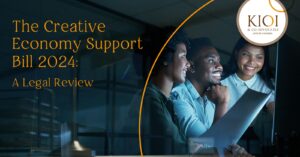
Introduction and Overview:
The Creative Economy Support Bill 2024 aims to provide essential support to individuals working in the creative industry. Its primary focus is on two main areas of intellectual property (IP): patents and copyrights. By emphasizing the financial backing of creative endeavours, the Bill intends to help the industry leverage its intellectual property for economic gain.
One of the key provisions of the Bill is the establishment of a Creative Industry Guild, designed to provide structured support for creatives. However, this approach has received criticism from the public, who argue that forming a guild does not address the deeper economic challenges facing the industry.
Establishment of a Guild
The Kenya Creative Economy Policy, introduced earlier this year, identified the lack of representative associations or guilds as a weakness in the creative industry. To address this, the Bill proposes establishing a state-backed guild.
While guilds have traditionally been formed by industry practitioners, this state-initiated version presents a unique model. Guilds in Europe, for example, historically organized themselves to protect the interests of members, such as artists and craftsmen, without government intervention. Kenya’s proposed Guild is expected to play a similar role but with state oversight.
Key Challenges and Proposed Solutions
The Bill addresses several significant challenges facing Kenya’s creative sector, as identified in the Kenya Creative Economy Policy:
- Limited Access to Financing:
The Bill obliges the government, both at the national and county levels, to collaborate with the private sector to improve financing for creative industry workers, particularly for women, youth, and people with disabilities. A Credit Guarantee Scheme and a Creatives Fund will be created to provide financial support, along with tax incentives, but only to Guild members.
Comment: While financial support is welcome, there are concerns about inclusivity. The requirement to be a member of the Guild may create barriers, limiting access to support for some creatives. Ensuring that membership is open and accessible is critical.
- Vulnerability to Intellectual Property Infringement:
The Guild is tasked with collaborating with IP enforcement agencies like KECOBO and KIPI to protect the IP rights of creatives. It will also work with agencies to ensure transparency in royalty distribution.
Comment: There are concerns about potential overlap between the Guild and existing IP bodies like KECOBO, which has faced criticism for transparency issues. The Bill needs to ensure that it adds value rather than duplicating existing efforts.
- Inadequate Technical Skills and Entrepreneurial Constraints:
The Bill proposes training programs and entrepreneurial development initiatives. The Guild’s Secretariat will promote partnerships with local and international bodies to build capacity for creatives.
Comment: This is a progressive approach to developing business skills within the creative industry. However, it’s unclear if these benefits will be available to non-Guild members, raising concerns about exclusivity.
- Inadequate Creative Industry Data:
The Guild will maintain a database to provide information on the creative sector and assist in strategy development. A public platform will also be established for training programs and incubators.
Comment: There are data protection concerns. The Bill does not clarify how the collected data will be handled in line with Kenya’s Data Protection Act, which must be addressed to avoid privacy violations.
- Limited Creative Industry Infrastructure:
Both national and county governments will be responsible for investing in physical and virtual infrastructure to support the creative industry. Virtual platforms may reduce the cost burden associated with physical infrastructure.
- Limited Market Access:
– The Guild will help creatives showcase their work and access new markets. The Cabinet Secretary for Trade is tasked with setting up an online platform to advertise creative products and events.
Comment: Care must be taken to ensure that market access isn’t limited to Guild members alone, as this could create a distorted market.
How Helpful Are the Proposals?
The Bill has the potential to support the creative industry in two main areas:
- Funding: If inclusivity is maintained, the financial support mechanisms will significantly benefit the creative industry. However, exclusivity in Guild membership could limit the effectiveness of these initiatives.
- Intellectual Property Protection: The collaboration between the Guild and IP agencies could enhance IP rights protection. However, the Bill must clearly outline how it will tackle existing transparency issues in royalty collection.
Potential Challenges and Concerns
- Bureaucracy and Overregulation:
The Guild’s application process could exclude many creatives, and there’s concern that overly rigid standards could stifle the flexibility needed in the creative market.
- Potential Redundancy of Laws and Vagueness:
The Bill’s collaboration with existing IP bodies may lead to duplication of roles. It must clearly define its relationship with these agencies to avoid confusion.
- Creation of Monopolies:
A state-backed Guild could lead to a monopoly, where only Guild members benefit, leaving others in the creative industry behind. Competition laws must be carefully applied to prevent this.
- Corruption, Nepotism, and Tribalism:
Kenya’s struggles with corruption pose a real threat to the successful implementation of the Bill. Ensuring transparency and fairness in the Guild’s operations will be crucial.
- Data Protection Concerns:
The Bill must align with Kenya’s Data Protection Act to safeguard creatives’ personal information.
Conclusion
The Creative Economy Support Bill 2024 presents an opportunity to enhance the creative sector, but several issues need to be addressed. Public participation and inclusivity will be key to ensuring its success.

